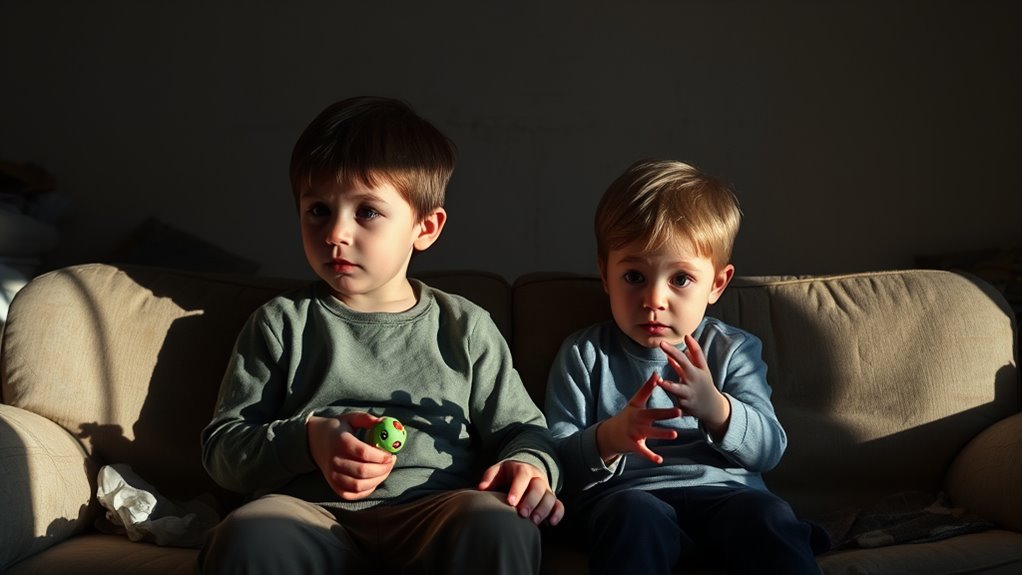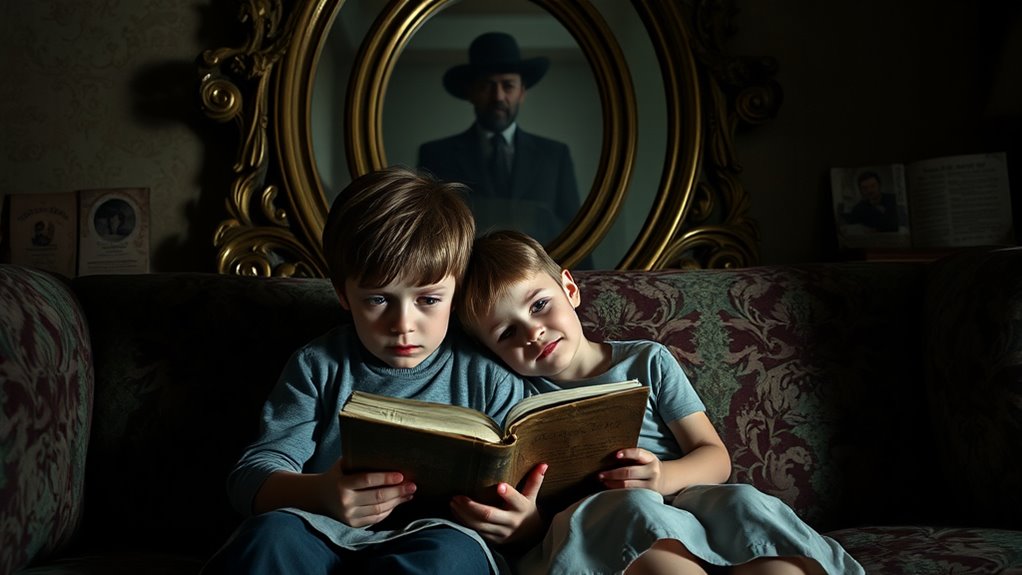In a narcissistic household, your sibling relationships often revolve around rivalry, manipulation, and unspoken roles like parentification, where you may have had to care for your family or mediate conflicts. Attention and affection are scarce, so you might find yourself competing or feeling scapegoated. These dynamics can create lasting emotional scars and complex bonds. Understanding these patterns helps you recognize their roots—if you keep exploring, you’ll discover ways to heal and establish healthier boundaries.
Key Takeaways
- Siblings often assume caregiving roles, blurring childhood boundaries due to neglect of emotional needs by narcissistic parents.
- Competition for parental attention fosters rivalry, favoritism, and feelings of inadequacy among siblings.
- Narcissistic parents scapegoat one sibling, creating blame and mistrust within sibling relationships.
- Interactions are characterized by manipulation, shifting alliances, and survival strategies rather than genuine bonds.
- Recognizing these dysfunctional dynamics and setting boundaries promotes healing and healthier sibling relationships.

Growing up in a household dominated by narcissistic parents profoundly shapes sibling relationships, often creating a complex web of loyalty, rivalry, and confusion. In such environments, you might find yourself assuming parentification roles, where one sibling takes on responsibilities typically belonging to a parent. This role can develop early, as narcissistic parents often neglect their emotional duties, leaving children to manage household chores, emotional support, or even their parent’s needs. When you’re placed in these parentification roles, it’s easy to feel overwhelmed or resentful, especially when your efforts go unrecognized. Instead of feeling like a child, you might constantly be acting as a caregiver or mediator, which blurs the boundaries between childhood and adulthood.
This dynamic often fuels rivalry and blame among siblings. Because resources—attention, affection, approval—are scarce in a narcissistic household, competition becomes fierce. You may find yourself competing for your parent’s favor or trying to outdo your siblings to gain a sense of worth. When one sibling receives praise or attention, others may feel resentment, triggering rivalry that can escalate into open conflict. At the same time, blame tends to be common. When something goes wrong, narcissistic parents often scapegoat one sibling or pit them against each other, reinforcing feelings of guilt and inadequacy. You might have experienced accusations or been made to feel responsible for family problems, even when you’re not at fault. This blame creates a toxic environment where trust erodes and relationships become strained.
In such households, sibling relationships are rarely straightforward. Instead of forming genuine bonds, you and your siblings often navigate a landscape riddled with manipulation, competition, and shifting alliances. The constant need to prove yourself or avoid blame can turn interactions into battles for survival rather than opportunities for connection. Narcissistic parents may also foster favoritism, which deepens divides, making you question your worth and your loyalty to your siblings. Over time, these patterns of rivalry and blame can lead to lasting emotional scars, influencing how you relate to your siblings well into adulthood. Recognizing these dynamics helps you understand that much of the conflict stems from the dysfunctional family environment, not from personal failings. Breaking free from these patterns requires awareness, healing, and establishing healthier boundaries—both with your siblings and yourself. Additionally, discovering the influence of anime culture and storytelling on emotional understanding can provide unique perspectives for healing and growth.
Frequently Asked Questions
How Do Siblings Typically Bond in Narcissistic Households?
In narcissistic households, you and your siblings often bond through shared resilience, leaning on each other to cope with emotional dependency on the narcissistic parent. You might find comfort in confiding and supporting one another, creating a fragile but essential connection. This emotional dependency can strengthen your relationship, as you rely on each other for understanding and validation amid the chaos. Together, you build a protective bond against the household’s toxic environment.
Can Sibling Rivalry Worsen in Such Environments?
Absolutely, sibling rivalry can skyrocket in such environments. The competition escalation feels like a never-ending rollercoaster, fueled by emotional manipulation that intensifies every disagreement. As kids struggle for validation, misunderstandings deepen, making conflicts more explosive. You might notice fights become more frequent and fierce, with underlying manipulation fueling the chaos. It’s like walking on a tightrope, where every misstep risks spiraling into a larger, more destructive rivalry.
What Role Do Younger Siblings Play in Family Dynamics?
You play a vital role in family dynamics, especially as a younger sibling. Your actions can influence sibling rivalry and highlight birth order effects. In a narcissistic household, you might seek validation or feel overshadowed, which can intensify competition. Your behavior can either escalate or diffuse tension, and understanding your place helps navigate relationships. Recognizing these factors empowers you to foster healthier interactions despite challenging family environments.
How Does Parental Favoritism Affect Sibling Relationships?
Favoritism is like a crooked compass, skewing sibling alignment and causing confusion. Its impacts ripple through relationships, making some siblings feel valued while others feel left out. When parents favor one child, it distorts trust and loyalty, often leading to rivalry and resentment. You might find yourself questioning fairness, struggling to maintain genuine bonds, as favoritism chips away at the foundation of sibling harmony.
Are There Long-Term Psychological Effects on Siblings?
Yes, you can experience long-term psychological effects such as diminished emotional resilience and trust issues. Growing up in a narcissistic household often causes you to struggle with self-esteem and forming healthy relationships later in life. You might find it hard to trust others or feel emotionally vulnerable, because your childhood was marked by favoritism and manipulation. These effects can persist unless you seek therapy or support to heal and build healthier patterns.
Conclusion
Managing sibling relationships in a narcissistic household can feel overwhelming, but recognizing the patterns is the first step toward healing. You might wonder if breaking free from these dynamics is possible—trust that it is. By setting boundaries and seeking support, you reclaim your sense of self. Remember, your worth isn’t defined by your family’s chaos. Isn’t it time you prioritize your well-being and create healthier connections for your future?










